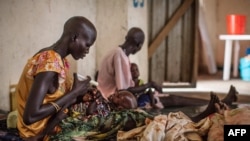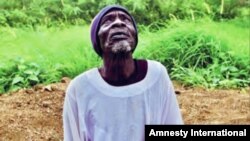The United Nations' top humanitarian official, Valerie Amos, said this week the international community must intervene quickly in South Sudan, or watch the young country sink even deeper into disaster and possible famine.
"If we don't take urgent action now, we will see a major humanitarian crisis unfolding in South Sudan with respect to food insecurity and the possibility of famine," Amos said after briefing the U.N. Security Council on the deteriorating situations in both South Sudan and Sudan.
Amos said ongoing fighting and the breakdown of the peace process for South Sudan is putting hundreds of thousands of lives at risk.
“My fear is that, because of the conflict - because the agreement that was reached between the two parties, that agreement is being broken every day and the fighting continuing - that we will see a very quick deterioration of the food security situation with the potential for a famine being declared very soon," Amos said.
My fear is that because of the conflict, because the agreement that was reached between the two parties... is being broken every day and the fighting continuing, we will see a very quick deterioration of the food security situation with the potential for a famine being declared very soon.Valerie Amos, UN Humanitarian Chief
She warned that famine is also a strong possibility in parts of South Kordofan, in Sudan. The United Nations and others in the international community say bombing raids carried out in South Kordofan and Blue Nile states by the government in Khartoum have forced large numbers of Sudanese from their homes and have interrupted farming.
"We have already heard that the famine early warning system network has forecast that the emergency levels of food insecurity are likely to persist among the internally displaced and host communities in SPLM-North controlled areas of South Kordofan between now and September," Amos said.
"I warned the Council that if aerial bombardment continues to disrupt agricultural activities, we can expect the impact to extend well beyond the harvest in September," she said.
Amos called on the Security Council and "anyone with any kind of political influence" to bring pressure to stop the violence on the warring parties in South Sudan and Sudan. She also called for U.N. humanitarian operations in the two Sudans to be scaled up significantly.
The U.N. says 1.5 million people have been displaced and around four million face alarming food insecurity as a result of seven months of fighting in South Sudan. It also says that tens of thousands have been displaced by violence in South Kordofan, which is one of Sudan’s biggest production areas for sorghum, a staple food.












